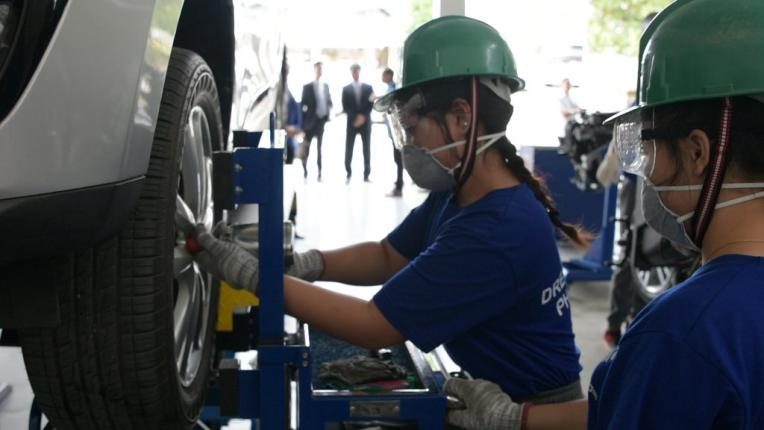3 JUNE 2020
by Fritzie Rodriguez

MANILA, Philippines: The COVID-19 pandemic has put millions of people worldwide out of work, paralyzing both small businesses and big industries.
While we all feel this pain, one group in particular is suffering in silence: young workers.
Globally, over 1 in 6 young people have stopped working since the onset of the COVID-19 crisis, the International Labor Organization (ILO) reported.
In the Philippines, the Department of Labor and Employment (DOLE) stated that at least 2.6 million workers have already been “temporarily or permanently displaced” from their jobs.
DOLE estimates that around 5 million Filipinos would lose their jobs to the pandemic. Meanwhile, some lawmakers give a bigger estimate of 10 million.
While exact figures on youth unemployment resulting from the pandemic are yet to be revealed, we can all agree that young Filipino workers are not immune to the economic fallouts resulting from this generation’s biggest health crisis. OUT OF WORK. Young workers are usually the first to be laid off in times of crisis or recessions. Photo from Plan International.
Vulnerable young workers
The services sector is hardest-hit by COVID-19, according to Labor Secretary Silvestre Bello III. More than half of all employed Filipinos belong to this sector.
In fact, among Filipino youth ages 15 to 24, the majority are working in the services sector. This totalled to around 3.8 million young workers, the 2017 labor statistics showed.
Jobs under this sector include wholesale and retail trade; accommodation and administrative services; information and communication; among others. Those working in tourism, restaurants, and transportation have suffered the most, according to Bello.
Quarantine measures make it hard for the above to continue normal operations. Businesses have endured financial losses, hence can no longer afford to keep as many employees, resulting in retrenchments and salary reductions.
Young Filipinos working in agriculture and industry are also affected.
Although some employees are allowed to work from home, hence are continuously receiving monthly salaries, this arrangement may not be applicable to all workers, given the nature of their jobs.
At worst, daily wage labourers, are not earning at all during the COVID-19 lockdown due to company policies like “no work, no pay.” Mobility restrictions have also made it hard for many workers.
Without a stable source of income, young Filipinos are losing their ability to pay for basic needs such as food, shelter, water, and medicine.
The situation is dire for young workers who have no one else to rely on but themselves. It is especially difficult for those who are also supporting families or whose parents have also lost their jobs or small businesses.
Why young workers
In any crisis, young workers are the first to get laid off, the ILO observed. This rings true for the Philippines, where some companies value years of service over other qualifications.
It is harder for young people to find decent jobs providing social and legal protection. In the Philippines, this challenge has existed even before the pandemic.
As for young entrepreneurs, it is harder for them to find resources to jumpstart and maintain their small businesses.
Globally, 3 in 4 young people work in the informal economy. They are among the hardest-hit by the pandemic, this includes those who are self-employed, wage workers in precarious employment, and unpaid family workers. They have little or no savings at all and cannot afford to take days off.
Many young workers are in non-standard forms of employment (i.e., part-time, temporary, gigs, freelance), which often has low pay, irregular hours, no benefits, and poor job security.Freelancers may have lost their projects due to the pandemic, leaving them in a financial state of limbo.
Young women are also more vulnerable because they make up more than half of all young workers in vulnerable sectors like hospitality and food services.
Tech-Voc students affected
The COVID-19 pandemic has interrupted students from pursuing their Technical-Vocational Education and Training (TVET).
Since most TVET courses require work-based learning such as apprenticeships and on-the-job trainings, it may be difficult for tech-voc schools to reopen. Distance learning options are yet to be fully explored.
Some students may be hesitant in going back to school because of the economic difficulties currently experienced by their families. They are likely to dropout and engage in informal employment to help their families, that is if they could get employed at all.
A significant number of these learners are stuck in dormitories. Their yearning for home increases as their stress levels, anxiety, and boredom have grown after being in quarantine for more than two months straight.
TVET graduates who were in the process of being deployed to their respective work units have been repatriated back to their provinces. It is uncertain if there are jobs waiting for them. Meanwhile, several tech-voc workers have been retrenched due to workplace displacement.
What can be done
The surge of youth unemployment and discontinuation of TVET, following the COVID-19 outbreak, affects everyone.
Without interventions, resulting economic impacts could last for decades, the ILO stressed.
Even without a crisis, the transition to decent employment is already tough for young people. Especially since 1 in 5 young people, under 25 years old, are NEET (not in employment, education, or training). The transition is now even more difficult because of the pandemic.
“We recommend the inclusion of youth economic empowerment in the conduct of COVID-19 response operations,” said Emilio Paz, Plan International Philippines’ Country Program Manager for youth economic empowerment.
“There should be special interventions for helping affected young workers and entrepreneurs — especially for those who were not reached by government interventions such as DOLE’s COVID-19 Adjustment Measures Program (CAMP) and the Department of Social Welfare and Development Social Amelioration Program (SAP),” Paz continued.
Now is the perfect time to maximize the use of e-learning tools. However, given the Philippines’ poor internet services, it is best to come up with other innovative learning options. This is especially true for low-income communities without access to cellphones and the internet.
We commend the Department of Education’s proposal to make use of public radio and television channels to air educational programs, as well as its plans to produce print modules to reach those without access to digital and broadcast media.
We recommend the provision of emergency cash assistance among affected young workers, so they could buy essential needs. Alternatively, they can be directly provided such items.
Cash-for-Work, Food-for-Work, Cash and Voucher Assistance may also be explored among communities. Interventions must be inclusive, hence pregnant workers, people with disabilities, and those without internet connectivity should always be taken into consideration.
COVID-19 response efforts should aim to lessen the burden of unpaid care work on women. Even before the pandemic, women and girls are 2 to 10 times more likely to take over household responsibilities — this hinders them from partaking in economic activities of their own (i.e., getting a job, running a business).
Advocacy efforts should educate and invite men and boys to become allies in supporting women’s economic empowerment. Special efforts should be made in advocating against domestic abuse.
We should assess the situation and needs of young entrepreneurs, whose small businesses may have closed or slowed down due to the pandemic.
It is also important to check on the mental well-being of TVET students and graduates, young workers and entrepreneurs, and those who were laid off. During these difficult times, we must ensure that they are not only physically healthy and safe, but also mentally and psycho-socially resilient.
In the coming months, more, albeit not all businesses will reopen.
Although they will be permitted by the government to operate, these businesses may no longer have the funds, manpower, capacity, and drive to do so. This is where our help would be mostly appreciated.
We must support young Filipinos in bringing them back on track in their journey towards youth economic empowerment.
Categories: Emergencies


